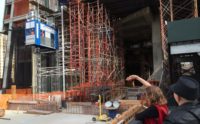Who Pays for the Neighbor’s Loss?
Who is responsible if a contractor damages the property adjacent to a construction project? In many instances, the contractor is responsible and must “indemnify” the project owner against any claims for such damage. However, a recent case decided by New York State’s highest court has highlighted important limitations of two standard contract provisions involving these types of claims. In the case, Watral & Sons, Inc. v. OC Riverhead 58 LLC, the Court found that a contractor was not responsible for “economic” damage that allegedly occurred at the property adjacent to a construction project as a result of the construction.

ANGELILLO
Watral was an excavation contractor on a contract to perform excavation, drainage and sanitary work for OC Riverhead, a property owner and the developer of an Applebee’s restaurant in Riverhead. While Watral was performing the work called for under its contract, one of its workers struck an underground power cable that provided electricity for Adchem, the store next door to the project, allegedly disrupting Adchem’s power. Before Watral began work at the project, “New York Call-One” had marked the location of the electrical cables on the property. The damaged cable was not where it was supposed to be because it had been moved by an unidentified electrician. Approximately two weeks later, again while Watral was performing excavation work at the project, the ground gave way, pulling the same power cable towards the project, damaging it and causing another power outage at Adchem. On both occasions, Watral paid part of the cost to fix the cable.
After completing its work, Watral requested payment from OC Riverhead for the amount due and owing under its contract. OC Riverhead refused to pay Watral, however, arguing that Adchem was threatening it with monetary damages resulting from the two power outages caused by the damaged cable. Watral filed a mechanics’ lien against the property and sued OC Riverhead for the balance due.
Although Watral won at trial, the appeals court reversed this decision and found that, under its contract, Watral had an obligation to indemnify OC Riverhead for Adchem’s damages resulting from the power outages. Watral appealed that decision to the state’s highest court, the Court of Appeals, which reversed the appeals court and restored the decision for Watral.
Watral’s contract was the commonly-used “AIA A-201” contract. It contained two sections that OC Riverhead argued applied in this case: the “indemnification” provision and the “Protection of Persons and Property” provision. Both of these provisions are designed to protect the owner from damages caused by a contractor. Generally, the indemnification provision requires the contractor to pay for any damages claimed against an owner as a result of the contractor’s negligence, while the Protection of Persons and Property clause requires the contractor to pay for any damage to property caused by the contractor, either at the project site itself or at an adjacent property. Notwithstanding these provisions, the Court of Appeals found that OC Riverhead had to pay Watral and that Watral was not responsible for any amounts that OC Riverhead had to pay Adchem.
With respect to the “indemnification” provision, the Court found that there was no evidence of negligence by Watral and, therefore, OC Riverhead was not protected by the indemnification clause. In the first incident, the electrician who moved the power cable was unidentified and not known to be under Watral’s control. In the second incident, Watral’s excavator did not even touch the cable and the owner’s representative had supervised Watral’s work in any event.
As to the “Protection of People and Property” clause, the Court found that “economic” injury, like that alleged by Adchem, was not covered. The Court concluded that the “Protection of Property” clause applies only to damage caused to physical property, such as trees, walks, roadways and structures. OC Riverhead did not claim that Watral had damaged any of Adchem’s physical property. The only item damaged was the electrical cable, which was on OC Riverhead’s property, not Adchem’s property.
This decision clarifies limitations of the indemnification and “Protection of Persons and Property” provisions of the AIA A-201 contract. However, the court based its decision on the unique facts of this case. It does not mean that contractors will never be responsible for damage they cause to an adjacent property. In fact, if the unidentified electrician in this case was shown to be under the control of Watral, the result likely would have been different. However, the case does clarify that the “Protection of Property” clause does not protect owners against their neighbor’s claims for “economic” injury caused by a contractor.

